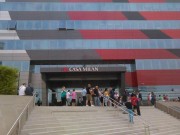England is famous for how passionate and numerous supporters of clubs in the Football League can be. This season, attendances in the Championship (second tier) averaged 20,084 per game, while in League One (third tier) they were 7,923 and in League Two (fourth tier) attendances averaged at 4,752. Compare this to Italy, where attendances in Serie B came in at an average of 6,884 per game in 2016/17, and at 2,326 in the Lega Pro.
English football is equally well-known for the vast amounts of money that teams – primarily in the Premier League – earn through TV rights and sponsorship deals, much of which ends up in players’ pockets. However, this constant – and ever-increasing – amount of cash swilling around at the top end of the English game seems to be having a knock-on effect further down the league.
Darragh MacAnthony, the chairman and owner of League One side Peterborough United, recently took to Facebook to shed light on the situation, revealing that although Football League sides are on the lookout for bargains by signing players on free transfers, many players’ wage demands are simply unrealistic.
“It’s been a fascinating May so far, talking to the many free transfers, many transfer targets that would need fees paid for them, and many agents of players from below and above possibly available,” MacAnthony wrote.
“One thing that’s for sure is the sudden shift in League One wage expectations. Some players from non-league are now turning their noses up, when not so long ago they would have walked on hot coals to sign and would have been sensible about the terms, built with incentives and an improved basic wage for the step up. Now some don’t even return calls or their agents think they can go higher.”
Gillingham typify the struggles of lower league clubs to keep themselves afloat. The Gills – a League One side, like MacAnthony’s Peterborough – saw their profit of £180,000 in 2015 turn into a loss of £800,000 in 2016, despite not signing a single player for a fee that year, while their entire squad cost just £80,000. MacAnthony explains that player wages have been a major factor in rising costs, and that the trend permeates all levels of football from the Premier League down to non-league.

“[Non-league players’] demands are way above even the average League One basic wage, these are lads who’ve never played in the Football League. Many are on less than £1,000 per week and the opening gambit now from agents is for a contract worth three times this.
“It’s even worse for league players who are out of contract or have been released, with wage demands getting out of control for players who have not done anything yet in the game or would be deemed as a punt. Many are under age of 24 (so have plenty of time to make their fortunes).
“Youngsters who are released or are not wanted by Premier League clubs, where they are on £600 or £700 per week, are now instantly expecting deals worth £2,500 or more per week, despite having not yet played 50 games of senior football.”
The underlying problem is that Football League clubs’ profits are frequently not keeping up with higher wage bills and increased expenditure. For instance, Gillingham’s turnover remained level at £5.68 million in 2016, while their wage bill had increased by 10%. According to a report by financial experts Begbies Taylor last month, four Football League clubs are in danger of folding. The report revealed that three clubs in League One and one in League Two are currently in “financial distress”.
MacAnthony fears that a number of clubs could go bankrupt unless players and agents back down over wage demands, but is positive that they will due to the fact that there are hundreds of players who are yet to be released by their clubs. Once they are released, it is simple economics: the supply of out-of-contract players will rapidly exceed demand, and players will have to be much more savvy in order to reach an agreement.
“This is May, with hundreds of footballers about to be released. June onwards should see some common sense and reality set in for lots of them and their demands. Right now it’s fun and games in many funny conversations with agents. The tide will soon turn. It has to turn, or our game at our level will see many casualties going forward if some clubs keep falling for these ridiculous demands. A good football club with good recruitment plan is based on signing the right characters who want success, growth and improvement, and understand that the big money comes after, and not before.”






































